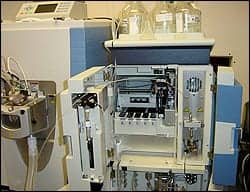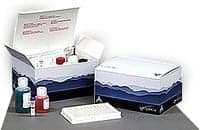Getting definitive information on toxicology with high-resolution accurate mass spectrometry
Kent G. Johnson, MS, director of Fortes Laboratories—a national toxicology lab located in Wilsonville, Ore—is licensed as a toxicological chemist by the National Registry of Certified Chemists, and is an active member of the Society of Forensic Toxicologists and the American Academy of Forensic Sciences. He serves as a consultant/inspector for the National Laboratory Certification Program, inspecting federally certified laboratories throughout the country for the Federal Department of Health and Human Services, and he has assisted the Drug Enforcement Administration in testing of unknown substances and with associated ensuing court cases.

Thermo Scientific’s Exactive LC-MS Mass Spectrometer is an easy-to-use benchtop system combining premium performance with a simple, intuitive interface.
First, the good news: The trend in toxicology is that testing will be increasingly in demand—in both volume and the number of assays needed. Now, the bad news: That increase will come because drug abuse continues to rise, with new substances constantly coming onto the scene. Of particular concern is the abuse of prescription medications. According to the National Institute on Drug Abuse, eight of the 13 most commonly abused drugs by teenagers are estimated to fall into this category, with one in 10 high school seniors reporting misuse of Vicodin (Hydrocodone) and one in 20 reporting misuse of Oxycontin (Oxycodone).
It is a trend and problem that Johnson knows all too well. He has seen cases in which a patient admitted to an emergency department tests negative by a standard point-of-care screening device, “and 2 days later, dies,” turning out to be “highly positive for benzodiazepine when tested by mass spectrometry,” he says. Seeking to attain the highest possible level of precision in drug testing, Johnson turned to mass spectrometry years ago, becoming one of the first lab directors to take the Thermo Scientific ITS 40 full scan Ion Trap mass spectrometry technology through federal certification in 1992.
In October 2008, Johnson—who holds a Master’s degree in forensic toxicology from the University of Florida—became the forensic toxicologist, scientific and laboratory director of Fortes Labs, which conducts drug testing in a number of contexts. The lab “contracts with the state,” he says, “to provide drug testing services for monitoring medical professionals such as doctors, nurses, and pharmacists who have had issues with drug and alcohol abuse.”
The lab provides urine drug testing and compliance monitoring of patients taking pain relief medications, and for agencies providing drug treatment and compliance services, drug courts, and forensic blood and urine testing for law enforcement agencies. The lab is also expanding into employee testing, pre-employment screening, random and postaccident checking, and is currently seeking Substance Abuse and Mental Health Services Administration certification.
Lots of Experience
Johnson came to Fortes with 34 years of experience in using mass spectrometry for toxicology testing, having previously set up laboratories in Kentucky, Texas, and Oregon. At Fortes, he chose to employ two instruments available through Thermo Fisher Scientific: the Thermo Scientific DSQ2 GC/MS (gas chromatography) and the Thermo Scientific Exactive LC/MS (liquid chromatography).
“I have used Thermo Scientific instruments for many years,” he says, “and always have had a good working relationship in developing tests and procedures for forensic urine and blood drug tests, and on the clinical side such as antirejection drugs and vitamin D.” He cites the accuracy and precision of mass spec as the instrumentation’s key benefit.
According to Johnson, the Exactive LC/MS system in place at Fortes can be used to identify substances that would otherwise be undetected and to distinguish among chemical compounds that would not be differentiated through other methods.
“You can have someone in the emergency room come up positive for amphetamine with a point-of care drug screening dip test,” he says, in which case the physicians would typically treat the individual as if he had taken the illicit drug methamphetamine. In fact, a number of patients testing positive for amphetamine turn out to have taken instead a heavy dose of antihistamines such as Sudafed or Benadryl. Appropriate treatment for these conditions is very different.
Johnson cites a case of a teenager treated for PCP and opiate overdose because of a drug screening result only, then mass spectrometry later revealed that the patient had in fact overdosed on dextromethorphan, found in some antihistamine formulas. Antihistamine abuse is becoming increasingly common among teenagers, and there is cross-reactivity among many nonamphetamine active ingredients, such as the chloropyramines and the dextromethorphan found in Robitussin, that can be resolved through mass spec analysis.
Johnson acknowledges that physicians in the emergency department “have enormous pressures, and sometimes need to make life-and-death decisions quickly,” but notes that, “If they give the wrong antidote or treatment, they can cause more harm than good.” Mass spectrometry testing is getting faster; the Thermo Scientific Exactive LC/MS system takes half as long as previous systems to return a result.
Johnson says that he can typically get an answer out to the physician within 1 to 2 hours, depending on how much sample prep is needed. Ideally, he says, “The ER can stabilize the patient until they get an absolute answer via mass spectrometry from the laboratory.”
Complex Technology
Mass spectrometry has been viewed as too complex for many laboratories, and it is not a technology to take on lightly. “There is definitely training that needs to be done in order to have a better understanding,” Johnson says. The lab needs to set up, process, and validate all assays before going online in order to ensure accurate and precise results. He points to Thermo Fisher’s “great training facilities” in West Palm Beach, Fla.
“It’s intense training,” he says, “up to 2 weeks, one-on-one and hands-on with the hardware and software.” He adds that Thermo Fisher has done a “marvelous job with technical support at all fronts,” and he also commends the company’s expertise in analysis of drugs and drug metabolites.

To keep up to speed with toxicology testing, visit this site often.
“Thermo Fisher has all the chemistry and background to assist the laboratories in setting up their analysis,” Johnson says, pointing out that the Society of Forensic Toxicologists has published several studies comparing traditional chromatography methods to those paired with mass spec that laboratorians may wish to consult.
In the end, Johnson says that the Thermo Scientific Exactive system offers a means to get “absolute information—true, accurate, and defensible—faster to the doctor.”
Suzanne Clancy, PhD, is a contributing writer for CLP.



